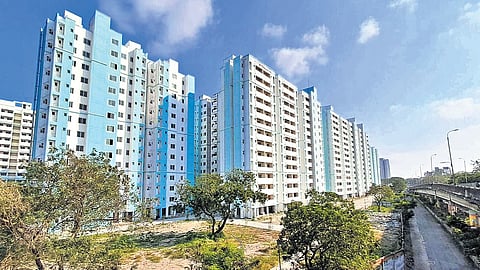

CHENNAI: Right opposite the site proposed for the controversial expansion of Ennore Thermal Power Station (ETPS) in Ernavur, in the northern end of Chennai, stand 33 identical 13-storey buildings, comprising 6,877 tiny flats, built for Rs 1,168 crore by the Tamil Nadu Housing Board (TNHB) for the urban poor.
Although the work on the flats got over in 2022, they still remain vacant. While officials cite the pending “electrical and water supply” works as the reason for the lack of occupancy, questions have been raised about the rationale in planning such a huge project at a place that has long been in focus for environmental concerns. These flats, expected to accommodate around 30,000 people, were meant for resettling poor families living in core city areas on objectionable poramboke lands.
When TNIE visited the flats, signs of deterioration were already apparent. Cracks on wall surfaces were noticed at multiple places. Workers were carrying out patchwork on the exterior walls. Inside many apartment units, white cement was used to plaster cracks.
Apart from the choice of the site, the fact that TNHB built these under PMAY-U (Pradhan Mantri Awas Yojana - Urban) is unusual since the Tamil Nadu Urban Habitat Development Board (TNUHDB) is the nodal agency for the scheme. TNHB may have pitched in for PMAY-U in a few places, but the board taking up a project of this scale is rare, if not being the first such instance, officials said.
Multiple red flags
The project faced opposition right from its proposal in 2017 – not only from a section of civil society who raised concerns over pollution but also from other government departments since the site was classified as a “special and hazardous zone” mainly intended for industrial use under the Second Master Plan of Chennai.
When TNHB wanted the land to be reclassified for the project, the Tamil Nadu Pollution Control Board (TNPCB) objected, citing potential pollution-related risks once the ETPS expansion is implemented, documents accessed by TNIE show. Similarly, the Tamil Nadu Power Generation Corporation Limited (TNPGCL) stated that a large residential complex could create impediments, especially with the extension of environmental clearance, for its ETPS project.
Despite the objections, CMDA in November 2018 approved the reclassification, primarily citing the presence of ETPS staff quarters and a few residential buildings coming up nearby.
Families waiting to leave
When TNIE spoke to a few families at the staff quarters, they dismissed CMDA’s reasoning and said issues due to fly ash and smoke emissions were a constant headache when the old ETPS plant was operational.
“Many families have already vacated the quarters. Others will also leave when the staff retire. We do not intend to live here permanently, unlike those who are going to occupy TNHB flats,” a resident said.
They also pointed out that the staff quarters are only two-storey structures, and TNHB flats are high rises. The impact due to pollution could be higher if ETPS expansion goes ahead, they added.
The expansion project has been facing inordinate delays and a public hearing was conducted only in December 2024. Not surprisingly, many cited the presence of TNHB flats as a reason to oppose the project.
Health concerns
M Raja (47) from Kattukuppam in Ennore, which is surrounded by power plants including one in Vallur Athipattu, said, “Over the last three years, we have lost three people in our community to cancer, including a school-going child. Our health is severely affected. Sometimes, while eating by the shore, ashes from the factories fall in our food,” he said, adding that anyone moving into the TNHB flats will also be affected severely.
Environmental activist Nityanand Jayaraman pointed out that many families would be willing to move to the flats since it has connectivity with the city, but the government must prioritise their safety and give up the ETPS expansion project instead, he added.
TNHB sources said the per-unit cost of the flat was around Rs 17 lakh, which is slightly higher than the ones built by TNUHDB. A TNHB official said the Centre provides Rs 1.5 lakh as a subsidy and the state Rs 12 lakh. The remaining Rs 3.5 lakh should be borne by the beneficiaries. Another official acknowledged that the long-term impact on health and safety should have been considered before approving such a project at this site.
Anshul Mishra, MD of TNUHDB, said TNHB has not officially handed over the flats yet, and it will happen within a month. Allocation process would begin after that, he added.